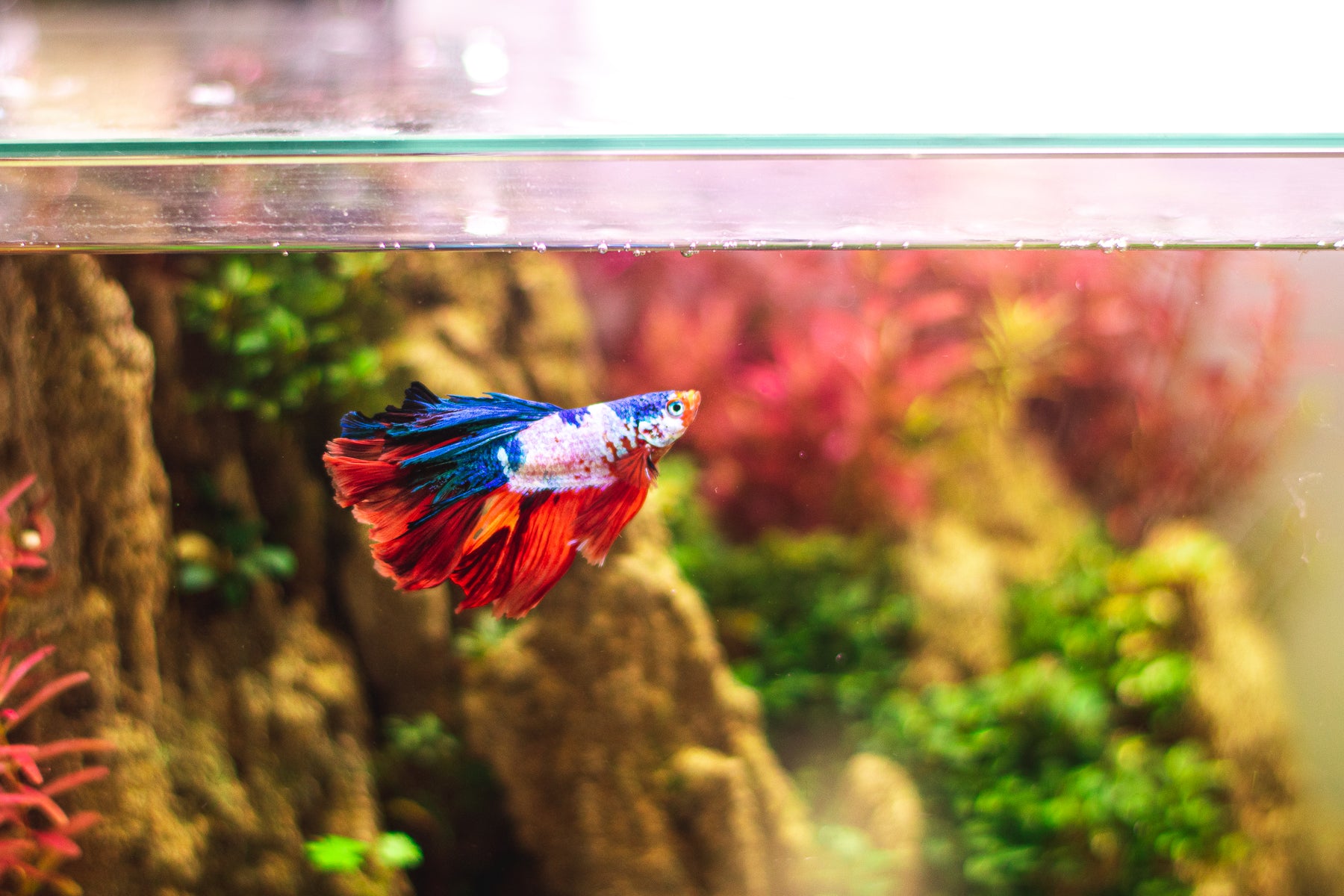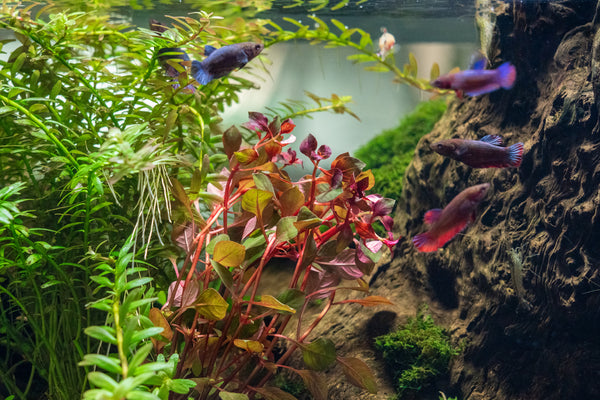
Keeping Bettas: How to Care for a Betta Fish
Written by: Tammy (@aquarist_tl) and Team Buce Plant
Betta fish are one of the most popular in the aquarium hobby because of their flashy colors, elegant finnage, and ease of care. In fact, bettas are considered an exceptional starting fish for beginner hobbyists due to their hardiness and accessibility--they can be found in most fish shops and large pet chain stores.
Unfortunately, it's common to see bettas being mistreated and cared for improperly. This is due to the many misconceptions regarding proper betta care and their necessities. As many betta enthusiasts say, "surviving is not thriving!"
When keeping bettas, our overarching goal is for them to be comfortable and happy under our care, just like our other pets. A planted tank full of places to explore, hide, and rest is the perfect environment to achieve this.
In this article, we'll discuss what you should have in your aquarium and the best conditions to keep your betta in. This ultimate guide on betta fish care will include:
1. Tank Requirements
2. Diet
3. Tank Mates
4. Exercise and Entertainment

Tank Requirements
1. Create a Comfortable Environment
As fishkeepers, we always strive to create a comfortable environment for our aquatic pets. With that being said, it's important to note that a planted tank would make the perfect betta home for multiple reasons. First, the aquarium plants make for great, shaded hiding and rest areas. Plus, plants act as natural filters and take up nitrate and ammonia, which can be harmful to fish in high doses. That being said, a planted tank can ensure the water is cleaner and parameters more stable.
In addition, bettas are very interactive fish that need stimulation. When in an empty tank with no decoration or anything to explore, they can get bored and develop self-destructive habits like biting their own tails. Instead, fill your betta tank with plenty of aquatic plants and hardscape that they can explore and swim around. This type of environment will boost your betta's health and happiness.
2. Tank Size
It's a common error to keep bettas in tiny decorative vases or 1-gallon bowls sold at big box pet stores. However, this is not the best environment for your fish, and we highly recommend upgrading to a larger habitat. Larger aquarium tank sizes will allow your betta to thrive and live the longest life possible. A smaller tank will allow waste and other chemicals to quickly build up and leads to detrimental health problems for your betta fish.
A betta tank should be a minimum of 3 gallons at the very least. However, if you plan to scape your aquarium to maximize your betta's quality of life, then a size of 5-10 gallons would be better suited. The UNS 5N, UNS 30C, and UNS 45U are excellent choices for a betta fish tank.
- Note: These fish are known to jump, so it is highly recommended to keep an aquarium lid on their tank.
3. Tank Lighting
Referring back to requirement #1, an aquarium filled with aquatic plants will allow your betta to live their best life. Lighting is especially necessary in this situation in order to allow your plants to live. Without a source of proper lighting, the aquatic plants you have in your betta tank can quickly die and release ammonia and nitrates, thus harming your Betta.
That being said, you should have a high-quality LED light on your tank for about 8 hours per day. A popular favorite for nano betta tanks is the ONF Flat Nano, which is dimmable and will provide your fish with light that replicates its natural habitat. The easiest way to regulate a schedule is through the use of a timer.

ONF Flat Nano LED Light on a UNS 45U tank
2. Proper Filtration
A common question among beginner fishkeepers in the hobby is: Do betta fish need a filter? The short answer is yes. However, you may have heard that bettas will do just fine without a filter. This argument stems from the fact that bettas have a labyrinth organ, which means they can breathe air from the atmosphere at the surface of the water. Many people think that because bettas are labyrinth breathers, a filter is not needed.
However, unless you are attempting to create a proper, self-sustaining filterless aquarium using the Walstad Method, then your betta is going to need a filter in its tank.
The main purpose of the filter is to mechanically and biologically cleanse the water in the aquarium to maintain beneficial bacteria and water quality, keeping the aquarium cycled and safe. In other words, filters clean fish waste and visible particles in the water, as well as convert the byproducts of organic waste like ammonia into less toxic compounds like nitrate (i.e. the Nitrogen Cycle).
For smaller-sized tanks, a hang-on-back or a simple sponge filter will do the job. Sponge filters are durable and more cost-friendly, while hang-on-backs take up less space in the aquarium to give a cleaner look. For a more high-tech, professional look, you can opt for a small canister filter like the UNS Delta 30.
Keep in mind that bettas prefer a lower flow and might have trouble swimming in a tank that has a filter with a high flow rate. For canister filters, you can use a reliever on the outflow lily pipe to decrease the flow. The Aquario Neo Flow Premium comes with an attachable reliever that reduces the outflow rate and creates for a more comfortable environment for fish.
- Note: Even if there‘s an aquarium filter in the tank, regular maintenance and weekly water changes are still necessary to keep your betta fish healthy.
4. Aquarium Heater
One important piece of equipment you may need is a heater. Many of those new to fishkeeping assume betta fish do not need heaters since they are seen being kept at room temperature in stores. However, they actually like it pretty warm and should be kept at a temperature of 75F-80F. At colder temperatures, they can become lethargic and less active than they should be.
Bettas are also prone to getting sick if they’re not kept at their ideal temperature range or experience frequent fluctuations in temperature. If you live in an area that gets quite cold or you keep the A/C running often, it's important to invest in an aquarium heater to keep your betta nice and toasty. The heater will help prevent the temperature of the water from swinging, resulting in less stress for the fish.

5. Water Parameters
First and foremost, make sure your tank is cycled prior to adding your betta. In an aquarium, ammonia can quickly build up to harmful levels for a betta and the plants in its environment. In a cycled tank, ammonia becomes nitrite through beneficial bacteria which is less harmful to the tank's inhabitants.
Before adding your betta to a tank, you should test for ammonia, nitrate, and nitrite levels. Below are the ideal numbers of each for a planted fish tank:
- Ammonia: 0.0 PPM
- Nitrite: 0.0 PPM
- Nitrate: <20 PPM
Fortunately, the more common species of betta fish that we see, Betta splendens, are bred in captivity all around the world and should be able to accept a wider range of water parameters compared to those found in the wild. They are able to tolerate low water flow with a pH of 6.5-7.5. Although they prefer soft water, Betta splendens will still do fine in moderately hard water.
- Note: Aquarium soil for your aquatic plants, like UNS Controsoil, is also beneficial to your betta because it softens and lowers the pH of water creating an ideal environment for a betta to thrive in.
If you are looking to keep a wild betta species, they will most likely need to be kept in softer, more acidic water. It’s best to research your specific species to be sure of their needs.
Tannins, although not absolutely necessary, can be added to the aquarium water to help achieve the water conditions needed to thrive. Tannins will excrete come from driftwood or botanicals that are placed in the aquarium and can create a blackwater effect. Adding tannins can help increase acidity in the water whilst acting as an antibacterial element, and can help decrease levels of harmful toxins in your aquarium water and keep your betta healthy.
Diet
What should I feed my betta?
Bettas are carnivores, so they require a diet that is rich in protein. There are many fish food brands that sell pellet foods designed specifically for betta fish. Although they can also eat flake food, it may result in uneaten food as they usually prefer pellets. Only feed your betta 2-4 pellets or flakes once a day.
Another option is cultivating live foods, like mosquito larvae or daphnia. Live food is definitely not necessary for them, but it would make a fun side project for those interested in trying! If you want to give them a real treat, then feeding your betta frozen bloodworms and brine shrimp should be irresistible for them. Since these are higher in protein, this substitute will lower the feeding schedule to once or twice per week.
Can I overfeed my betta?
Although it may be tempting, do not feed your betta more than what is recommended. Bloating, digestive issues, and obesity are common results of an overfed betta. These can lead to severe health problems or even death.
In addition, excess food means excess waste. Uneaten food will fall to the bottom of the tank and will decompose and produce excess ammonia, which can be harmful to your betta and can result in unwanted algae.

Tank Mates
Can I keep multiple bettas in one tank?
Another name for Betta Splendens is the 'Siamese Fighting Fish.' As the name states, the males of this species are known for picking fights with other bettas, or similarly sized fish, and are extremely territorial. They are capable of doing serious damage to other inhabitants in the tank, possibly even killing them. This is why you may see them being sold individually in cups or other small containers at fish stores.
That being said, you should never keep more than one male betta in a single tank. Females, on the other hand, are able to coexist with one another. This is commonly referred to as a betta sorority.
Unfortunately, it is hard to say for certain what other fauna can and cannot live with your betta because each betta has its own personality. Some are more peaceful while others can be very aggressive. Just keep in mind that if you plan on keeping a male betta, then it's recommended to keep that male betta alone in your aquarium.
What other fauna can I keep in a betta tank?
Nano fish that are fast swimmers and known for being peaceful are typically fine Bettas as tank mates so long as there’s enough room for everyone. Examples include Neon Tetras, Cardinal Tetras, Harlequin Rasboras, and other small schooling fish.
Bottom-dwellers like Corydoras, Plecostomus, Loaches, and Gobies should also be able to coexist with bettas. This is because bettas tend to feed from the surface of the water and would generally be more territorial at the top of the water column. It is possible to even house large aquatic snails like Nerite Snails, Rabbit Snails, and Mystery Snails with bettas as long as you reduce the potential of them getting eaten by providing your betta a good diet.
Although some bettas might consider shrimp a "snack," certain shrimp are common tank mates for a betta so long as the ideal tank conditions are met for both inhabitants. Amano shrimps make great tank mates due to their dull colors betta fish aren't threatened by. Being bottom feeders, these shrimp will not get in the way of your betta during feeding time.
- Pro Tip: If you notice your betta chasing the other inhabitants around, you can try adding more decorations or aquatic plants to act as visual barriers in the aquarium.

Betta sorority tank
Exercise & Entertainment
How do I give my betta the exercise it needs?
Unlike other fish in the hobby, it is recommended to exercise your Betta several times per week. Exercising your betta allows them to stay active by reducing their boredom and mimicking typical encounters in the wild. To exercise your Betta, you can simply hold up a mirror against them, so they see their own reflection.
This can also work with a pen or even your finger. The Betta should flare up in aggression towards the object you are using to mimic another Betta fish in its territory. The flaring of its fins and the puffing of its gills is the exercise result you are looking for.
Repeating this several times a week keeps the Betta fish on its toes and prevents it from getting bored. A bored Betta may adopt destructive habits like biting on its own fins, so entertainment is important for these fish. Keep in mind that an aquascape full of aquarium plants, holes, and crevices to swim through would help add some excitement to their lives.

Bettas are a beautiful and vibrant species of fish that are excellent aquatic pets for both new and experienced fishkeeping hobbyists. They are very responsive to their owners and are always eager to eat! So long as you setup up a proper tank with enough plants and hiding spots, your betta and its tank mates will be happy and healthy under your care.
Tell us - Was this article helpful? Please leave a comment below!
If you have any questions regarding this article, please DM us on Instagram, Facebook, or email support@buceplant.com so we can assist you - @buceplant





Comments
Leave a comment